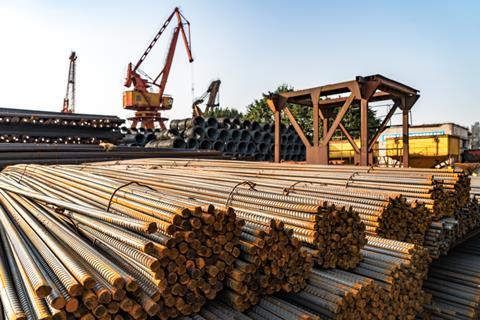Post-Brexit trade advisor says benefits outweigh harms of dumping
Proposals to end the ban on Chinese rebar imports have been labelled “utter madness” by the British steel industry because of concerns over quality and the amount of carbon produced during manufacture.
The government’s post-Brexit trade advisory board says the embargo, implemented in 2016 at the behest of the European Commission, is harming the UK’s economy by cutting off a source of affordable construction material.
There is currently huge demand for imported rebar but prices have soared since Russia’s invasion of Ukraine in February, with 27% of the UK’s supply coming from the two countries and from Russia’s ally Belarus.

Anti-dumping duties were put in place by the EU in last July, after concerns that the UK steel market was being flooded by cut-rate Chinese steel, often produced by state subsidised companies.
The Trade Remedies Authority (TRA), which has been reviewing transitioned EU trade measures since it was set up in June last year, found that dumping was likely to recur if the ban was lifted, but that the impact on the economy of leaving it in place outweighs the potential harm to the UK market, which consists of a single rebar producer.
ONS data showed a 31.6% price rise for rebar in March, explained by the impact of the Ukraine war.
But the British Association of Reinforcement (BAR), which represents the steel manufacturing industry, said there is enough steel producing capacity in the UK and Europe to make up for the loss of imports from eastern Europe.
Trends and prices data dashboard

Your one-stop-shop for the all the latest price changes and trends in the building materials, energy, housing and construction labour markets.
Building’s trends and prices data dashboard pulls together figures from 14 different datasets into easy-to-use line graphs, bar charts and animated visualisations.
“The TRA proposals are an overreaction and do not fully take into account the manufacturing resources of UK and European steel mills,” said BAR chairman Steve Elliott.
“In terms of the significant additional CO2 emissions from importing Chinese steel and concerns over quality, the proposals are utter madness.”
Elliott noted that Chinese steel is often manufactured using basic oxygen furnaces, which produce significantly more CO2 than the electric arc furnaces used in European steel mills.
Oliver Griffiths, chief executive of the TRA, said the body has a duty to weigh up the impact of dumping against the broader effects on the economy.
He added: “In this case, our assessment is that high domestic demand and international supply shortages mean that retaining tariffs on HFP rebar from China would push up prices for key elements of the UK economy, such as construction.
“Our judgement is that the impact on the British economy of higher prices would significantly outweigh the impact on the sole UK producer of rebar of removing tariffs on Chinese imports.”
There is a 30-day period following the publication of the TRA’s initial findings in which interested parties can submit their comments.
The body will then produce a final recommendation, which will be sent to the secretary of state for international trade to decide what to do next.


























No comments yet